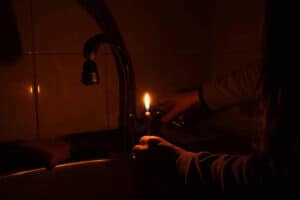The largest union at the power utility is losing confidence in the electricity minister’s ability to end rolling blackouts.

The National Union of Mineworkers (NUM) has accused struggling power utility Eskom of not being willing to buy spare parts to fix generation units after breakdowns, and when it does, of sourcing substandard components.
NUM Highveld regional chair Malekutu Motubatse made this claim while speaking to Jeremy Maggs on the Moneyweb@Midday show on Thursday.
He said NUM became aware of the issue after it engaged with members who work at the utility. He criticised Eskom for sourcing “substandard” parts that are not fit for purpose and which aid the continuous tripping of units.
Motubatse said one of the parts Eskom is struggling with is oil burners. He said Unit 2 of Matla Power Station, which is supposed to contribute about 600MW to the national grid, is currently only contributing just above 200MW because its oil burners need to be either serviced or replaced.
“So it is a matter of not having spares to fix these units. We need to buy spares … and fix the unit so that we can deal with load shedding,” he said.
“But as for now people, they don’t have the will – they are not willing to buy spares. In actual fact, corruption is the one that is taking centre stage at Eskom currently.”
Eskom did not respond to Moneyweb’s request for comment by the time of publication.
Cold winter ahead
Households should prepare to brave through yet another cold winter this year as Eskom executives confirmed that Stage 5 power cuts will be the standard in coming months as it struggles to meet demand, with the possibility that the situation could worsen daily.
ALSO READ: Load shedding: SA unlikely to experience complete blackout, says Ramokgopa
According to Eskom, which held a media briefing at Megawatt Park on Thursday, its energy availability factor (EAF) declined to 56% in the past financial year, falling below its 60% target.
Contributing to its poor performance is the unavailability of three generation units at Kusile Power Station and another at Koeberg.
Altogether, the absence of these units is costing the national grid 3 000MW of generation capacity – representing at least three stages of load shedding.
The Kusile units are reportedly offline due to a failure of one flue gas duct and are only expected to return to service in November.
The Koeberg unit has been offline since October 2022 and is undergoing maintenance. It also needs refuelling and a steam generator replacement to be undertaken.
The Koeberg unit is expected to return to service in September.
ALSO READ: Higher load shedding stages will have ‘extremely detrimental effect’ on domestic economy
“We are striving to reduce plant breakdowns to 15 000MW or below for the winter period to keep load shedding at lower stages,” generation group executive Bheki Nxumalo said in a statement.
“We however concede that this will be extremely hard given the unreliability and unpredictability of the power generating fleet and that we are already about 3 000MW worse off this winter compared to the same period last year.”
Eskom executives have denounced claims that a national grid collapse is imminent.
Eskom group executive for transmission Segomoco Scheppers said should generation capacity losses reach 18 000MW households and businesses will be subjected to Stage 8 load shedding, which will mean up to 12 hours a day without power. According to Eskom, this is the worst case scenario on the table.
“Efforts are underway to return a number of units from outages to mitigate the worst case scenario of 18 000MW or above from materialising. Eskom will also keep planned maintenance at a maximum of 3 000MW during the winter period,” said Scheppers.
ALSO READ: De Ruyter compares Ramaphosa to a ‘genial country club manager’ in new book
No confidence in Ramokgopa
The NUM says it has lost confidence in Minister of Electricity Kgosientsho Ramokgopa’s ability to fix the load shedding issue after being tasked to solve the power crisis in March by President Cyril Ramaphosa.
“We have been observing since he was appointed – it should be three months now – and there are no changes,” said Motubatse.
“In fact, we are experiencing the worst form of stages of load shedding … The situation is unbearable.”
Motubatse criticised the minister for focusing his engagements on the wrong issues, saying that he should pay more attention to Mpumalanga as this is the region where critical generation capacity is concentrated.
“The minister has been going around like a political celebrity, not even engaging us in Mpumalanga,” he said.
“We can bring solutions to the table but we cannot bring solutions to the table if the minister is not engaging with us. He must come here and engage with us if he is serious about ending load shedding.”
This article originally appeared on Moneyweb and was republished with permission.
Read the original article here.
Support Local Journalism
Add The Citizen as a Preferred Source on Google and follow us on Google News to see more of our trusted reporting in Google News and Top Stories.






